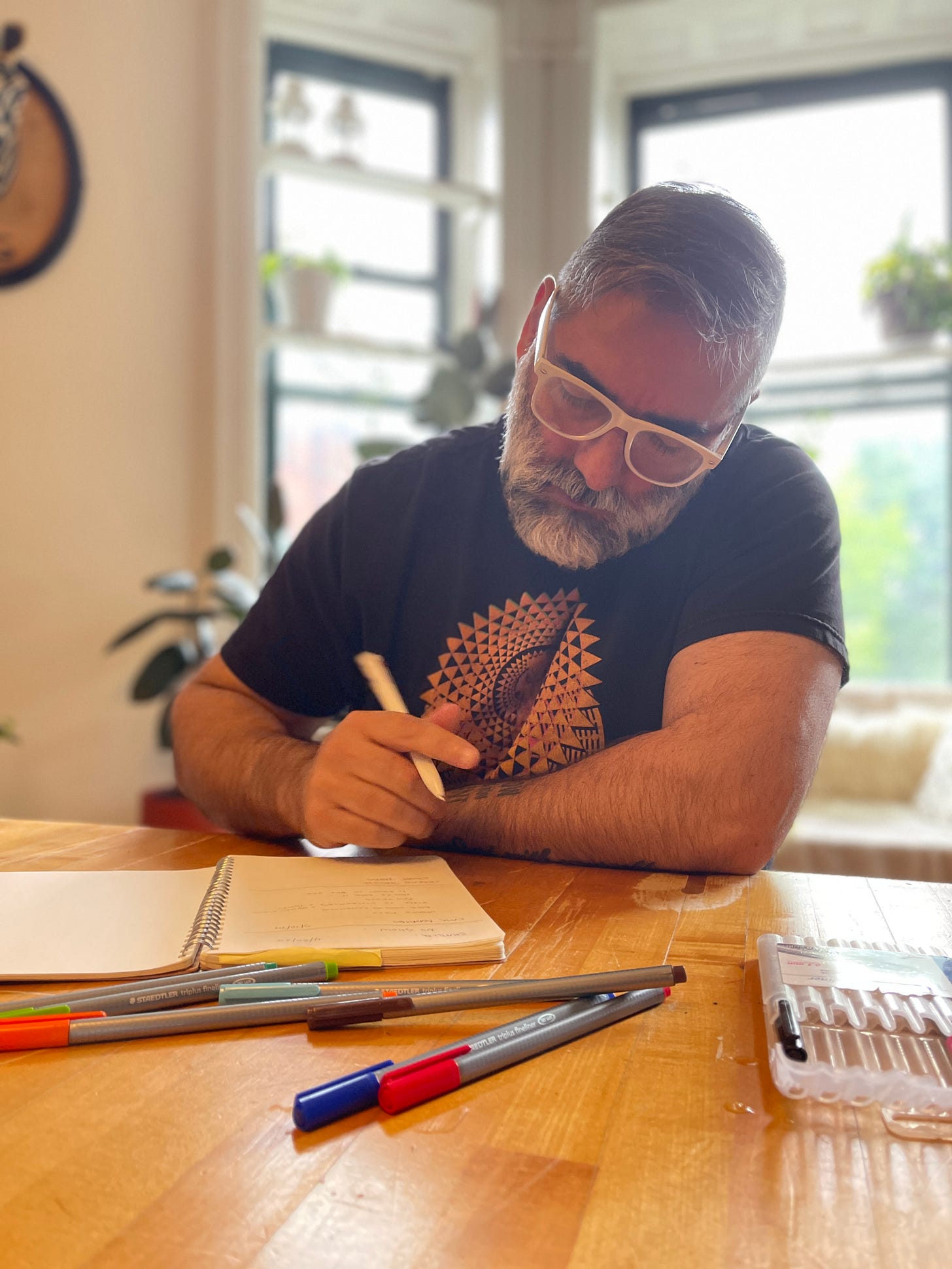The Power of Gratitude
Unlock Your Full Potential. Tips to Boost Your Emotional Intelligence & Resilience.
I'm Manuel Saez, I write to help founders master emotional intelligence to make decisions with clarity 🌻 EQ coach, 2X-founder & award-winning designer ➜ I love fixing old motorcycles 🛵 🏍
Reading time: 7 min.
Contents:
My Journey with Gratitude
Gratitude as a Catalyst for Emotional Resilience
Practicing Gratitude to Boost Emotional Intelligence
The Broader Impact of Gratitude
Achieving Full Potential Through Gratitude
For a long time, I thought gratitude was just a nice idea—something people talked about but didn't really change anything. Oh boy, I was wrong...
It wasn't until I started practicing it myself that I realized how powerful it could be. Here is what I learned.
My Journey with Gratitude
I've been practicing gratitude for years, but about a year ago, I started posting nightly on X, sharing three things I was grateful for. At first, I felt a bit awkward. I felt vulnerable and exposed, and my ego did not want me to appear weak or depressed.
But soon, the responses started pouring in. People appreciated the reminder to focus on the positive things they have, and many began their own gratitude practices, often thanking me for the inspiration.
One thing I learned quickly was how gratitude can shift your mindset. It's not just about listing things you're thankful for; it's about truly feeling that appreciation and allowing it to change your perspective.
This daily practice became a powerful tool in my emotional intelligence toolkit, enhancing my self-awareness. Soon after committing to posting every day, my mind was on automatic during the day, looking for things to be grateful for. This change set my days on a positive path, making my life much more enjoyable. If you want to get these daily gratitude reminders, follow me on X @supermanuelsaez
Gratitude as a Catalyst for Emotional Resilience
During challenging times, gratitude became my anchor. Focusing on appreciation helped me regain my balance whenever I felt overwhelmed or emotionally drained.
I remember days when I was so depressed and burned out that my time doing my gratitude journal was the highlight of my day, the time when I could find joy and peace. It's amazing how acknowledging the good in your life, no matter how small, can lift you out of an emotional rut.
Scientific studies back this up. Research shows that gratitude can increase serotonin and dopamine levels, the "feel-good" chemicals in our brains. By practicing gratitude, you're essentially training your brain to look for positives, which can significantly improve your emotional well-being.
As a founder, this has been particularly important for me, where the stress and pressure can sometimes feel overwhelming. Gratitude helped me build emotional resilience, enabling me to handle setbacks and challenges with a more positive outlook.
Gratitude also helped me build stronger relationships. When you have your gratitude antennas on, you perceive other people’s efforts faster and more often. Expressing gratitude to others creates a deeper connection and mutual respect. This was especially true in my professional life, where showing appreciation for my team's efforts led to a more positive and productive work environment.
Practicing Gratitude to Boost Emotional Intelligence
Gratitude isn't just about feeling good; in my experience, it's one of the best practices to develop emotional intelligence.
Here's how I integrated it into my daily routine:
Self-Awareness: I started my day with a gratitude journal. Writing down things I was grateful for helped me become more aware of my emotions and set a positive tone for the day. This practice made me more mindful of the positive aspects of my life and helped me start each day with a sense of appreciation and optimism.
Self-Regulation: Whenever I faced a challenge and negative emotions crept in, I paused, took a deep breath, and looked for the goodness of what was happening. This simple act helped me manage my reactions and maintain a positive mindset. It reminded me that there are good things even in our problems, making dealing with stress and negative emotions easier.
Empathy: Expressing gratitude to others strengthened my relationships. It made me more attuned to their emotions and fostered a deeper connection. Showing appreciation not only makes others feel valued but also enhances your own self-appreciation, a total ninja move in the emotional intelligence handbook if you ask me :)
By regularly practicing gratitude, I noticed improvements in my interpersonal relationships and decision-making processes. It wasn't about ignoring the negative but rather acknowledging and balancing it with the positive. This balance is crucial to emotional intelligence, allowing me to deal with problems with a more resilient and positive mindset.
The Broader Impact of Gratitude
Gratitude's impact extends beyond personal benefits. It influences physical health, stress management, and even professional relationships.
For instance, grateful individuals tend to have better sleep patterns and lower stress levels, contributing to overall physical health. Studies show that people who practice gratitude regularly have better cardiovascular health and lower levels of inflammation.
In my professional life, expressing gratitude created a more positive work environment. It encouraged collaboration and increased job satisfaction among team members. By incorporating gratitude into our daily interactions, we built a culture of appreciation and support, enhancing individual and team performance.
One example I used to practice with my team was starting meetings, especially those involving hard conversations, by asking them about the good things they had going on. This simple shift in focus helped reduce tension and made people more receptive to discussing more complicated topics. It's amazing how such a small practice can profoundly impact team dynamics and overall workplace morale.
Also, gratitude has been shown to improve leadership skills. I heard that you can know a lot about a person by observing how they treat a waiter or waitress. Leaders who practice gratitude are more likely to create positive and supportive environments, which can lead to increased employee engagement and productivity. This is because gratitude helps leaders be more empathetic and understanding, which are critical components of emotional intelligence.
Achieving Full Potential Through Gratitude
Incorporating gratitude into my daily routine has been one of the most impactful changes I've made in my personal and professional growth journey.
It's not just a feel-good practice; it's a powerful tool for developing emotional intelligence and resilience. I know this because I became a different person since I committed to daily practice.
Gratitude helped me navigate emotional challenges, improve my relationships, and enhance my decision-making skills.
It played a crucial role in helping me achieve a balanced life. Ultimately, I feel closer than ever to reaching my full potential.
By regularly practicing gratitude, I've maintained a positive outlook, even in the face of adversity, and built stronger, more meaningful relationships.
I encourage you to start your own gratitude practice. Whether it's a daily journal entry or sharing your thoughts with others, find what works for you and commit to it. As you begin to embrace gratitude, you'll likely find it easier to navigate life's ups and downs, develop more robust emotional intelligence, and achieve your full potential.
Remember, it's not about being perfect or having it all figured out. It's about recognizing the good, appreciating the journey, and striving to be the best version of yourself.
Sending you good vibes 🌻
Manuel Saez






I thrive because of gratitude! Thank you for this,Manuel. We should never forget to be thankful ☺️
Amazing advice! I was one of those people you mentioned who didn’t understand how powerful gratitude was until I tried it 🤯